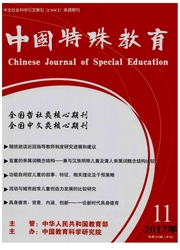

 中文摘要:
中文摘要:
目的:探讨父母心理控制、行为控制对青少年网络成瘾的影响。方法:从济南市某中学选取初一、初二、高一、高二402名中学生为样本,采用Shek等编制的父母心理控制、行为控制量表、陈淑惠等编制的青少年网络成瘾量表进行测查。结果:(1)1年之后,父母的心理控制、行为控制均有显著增加。(2)前测心理控制与后测青少年网络成瘾倾向显著正相关,前测行为控制与后测青少年网络成瘾倾向显著负相关;前测心理控制与后测男生的网络成瘾倾向显著正相关,前测行为控制与后测女生的网络成瘾倾向显著负相关。(3)心理控制显著正向预测青少年1年后的网络成瘾倾向,行为控制显著负向预测1年后的青少年网络成瘾倾向。心理控制显著正向预测男生i年后的网络成瘾倾向;行为控制显著负向预测女生1年后的网络成瘾倾向。结论:父母心理控制、行为控制能够显著预测青少年的网络成瘾,预测模式存在性别差异。
 英文摘要:
英文摘要:
The present study aims to explore the effect of parents' psychological control and behavioral control on Intemet addiction in adolescents, by using relevant scales to survey 402 secondary school students in Ji' nan, Shandong Province. The results show the following: (1) The parents' psychological control and behavioral control increased after a year. (2) There was a significantly positive correlation between the pretest psychological control and the post-test Intemet Addiction in the adolescents (especially the boys), and a significantly negative correlation between the pretest behavioral control and the post-test Internet Addiction in the adolescents (especially the girls); (3) Psychological control and behavioral control helped to predict Internet Addiction in the adolescents after a year positively and negatively, respectively; psychological control helped to positively predict Internet Addiction in the boys after a year, and behavioral control helped to negatively predict Intemet Addiction in the girls after a year. The authors conclude that parents' psychological control and behavioral control can significantly predict Internet addiction in adolescents, but the modes of prediction show a gender difference.
 同期刊论文项目
同期刊论文项目
 同项目期刊论文
同项目期刊论文
 The explicit and implicit outcome expectancies of Internet games and their relationships with Intern
The explicit and implicit outcome expectancies of Internet games and their relationships with Intern Perceived parent-adolescent relationship, perceived parental online behaviors and pathological Inter
Perceived parent-adolescent relationship, perceived parental online behaviors and pathological Inter Decreased functional connectivity between ventral tegmental area and nucleus accumbens inInternet ga
Decreased functional connectivity between ventral tegmental area and nucleus accumbens inInternet ga Impaired decision-making under risk is associated with gaming-specific inhibitiondeficits among coll
Impaired decision-making under risk is associated with gaming-specific inhibitiondeficits among coll 期刊信息
期刊信息
